from Liberty
Real Money
by Ellis Parker Butler
The recent amazing decline in stock prices brought loss and woe to a great many people, but not to all. One of those to whom it brought happiness and an actual money profit was Professor Horace Willicks of Colwin College.
Professor Willicks is an elderly, nervous, absent-minded man, occupying the chair of Abstract Philosophy at Colwin College, and he has been a widower for thirty-two years. Thirty-one years ago his sister Emmy came to keep house for him and to see that he did not go to his classes without his trousers or let his absent-mindedness make him too ridiculous in other ways.
Emmy Willicks was much like her brother Horace. She was a gentle timid soul -- not at all self-assertive -- and two years older than her brother. She was intellectual rather than social, and her greatest desire in life was to save enough money to buy a house in Concord, Massachusetts, where she and her brother Horace might live their old age, studying the lives of Emerson, Thoreau, Hawthorne, and the others, and writing a three-volume study of the great Concordians. In this work Professor Willicks was to do the part dealing with the Concord philosophy, and Emmy was to handle the rest. It may be said that Professor Willicks and his sister Emmy lived for this one great object.
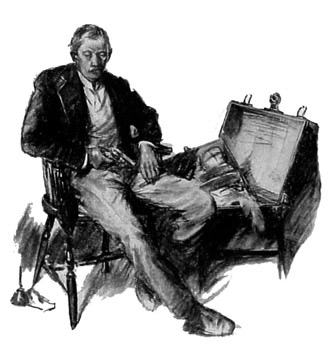
The salary of Professor Willicks was small and but little more than covered the household expenses. Emmy Willicks had a small, inherited income, and all of this, with what she could save of her brother's salary, she put away in the Colwin Savings Bank. This slowly growing fund was to give them freedom and happiness in Concord when it amounted to enough. It grew very slowly.
About the time when stocks began to climb upward Emmy Willicks happened to become friendly with Eliza Trent, the wife of Professor Oscar Trent, who occupied the chair of Applied Economics at Colwin College. Eliza Trent was a positive and somewhat worldly woman, and far the best dressed of the college wives. She had considerable money in her own right and considered contract bridge intellectual enough to satisfy anyone. Her husband was a handsome man, below middle age, and was sure he knew as much about business conditions in the United States as any other man. He frankly predicted an era of prosperity such as the world had never known.
To gentle Emmy Willicks with her smoothed-back graying hair Oscar Trent was an oracle of finance. In a world of which she knew nothing whatever he seemed to her to be a giant. One evening when she responded to Eliza Trent's appeal and helped make up a table of bridge at the Trents', Professor Trent talked of stocks.
Miss Emmy was one of those bridge players who put down a card and then put hand to mouth and say, "Oh, partner! I'm so sorry! I shouldn't have played that!" and who forget what is trumps. She played bridge to be accommodating.
"Yes," said Professor Trent in his world-informing way. "There is no doubt whatever that we are in for a long and permanent advance in values. The United States has been thinking on this plane, actual values are on this plane, and our ideas -- and prices, naturally -- must climb."
He showed the two planes with an extended hand. One was on a level with his chest; the other was considerably over his head.
"I am buying Independent Oxygen," said Eliza Trent. "On a margin, of course."
"Independent Oxygen," said Professor Trent, "I consider one of the soundest properties in existence. Its past history, the continuous increase in population, the use of oxyacetylene torches, and the shifting of the Gulf Stream, with the consequent increase of fogs and pneumonia, make a safe buy of Independent Oxygen. I can safely say that an investment in Independent Oxygen at today's price will mean financial independence for the buyer in a remarkably short time."
"How would I store the oxygen if I bought some?" Miss Willicks asked timidly.
"My dear lady!" said Professor Trent. "You don't buy the article itself; you buy the shares of the company that manufactures and sells the oxygen."
There followed a further explanation, in which Mrs. Trent took a lively and enthusiastic part, and when Miss Willicks went home she had a vague and pulse-quickening knowledge of how to buy on margin and a sincere belief that she and her brother Horace were a couple of silly old fogies who had let themselves slip out of the current of actual life. The next morning she went to the savings bank and drew out most of her money. This she put in an envelope, and on the envelope she wrote some figures, and at breakfast she gave the envelope to Horace.
"Wait! Wait, Horace!" she exclaimed, for he had the saltshaker in his hand. "You've already salted your egg three times, brother."
"Have I, Emmy?" he asked. "I knew it tasted odd; I thought it must need salt."
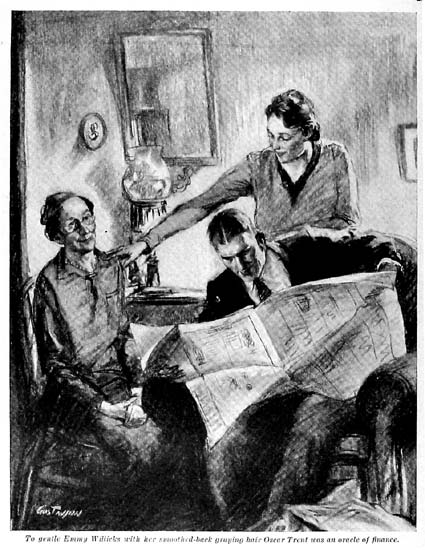
"Listen, Horace, dear," Miss Emmy said. "Please pay attention to me -- close attention."
"I know," said Horace. "I'll mail it, sister."
"No," said Miss Willicks. "It's not a letter to mail. There are two thousand dollars in this envelope."
"Dear me! You surprise me!"
"Two thousand dollars," repeated Miss Willicks, "and -- please pay attention, Horace!"
"Yes, my dear," said the professor vaguely. "You were saying?"
"Two thousand dollars," repeated Miss Willicks again. "And I want to buy Independent Oxygen stocks with it. Professor Trent says I should."
"I'm quite sure he would not say so unless he was quite sure it was quite right," said Professor Willicks. "Isn't that almost all the money you have, Emmy?"
"Yes, practically all," said Emmy. "But I am sure I am right if Professor Trent advises me to buy. I want you to buy it for me, Horace."
"Yes, indeed, my dear," said Horace agreeably. "I will attend to it before I go to my class. Universal Oxygen, did you say, Emmy?"
"No, not Universal Oxygen, Horace. Universal Oxygen doesn't seem good to Professor Trent. It is Independent Oxygen I want to buy," the professor's sister told him. "I've written it all down on this envelope -- four hundred shares of Independent Oxygen at twenty dollars a share."
"But, my dear!" said Professor Willicks, smiling at his sister; "four hundred shares at twenty dollars comes to eight thousand dollars, not two thousand."
"I know all that, Horace," Miss Emmy said. "But Professor Trent and Eliza explained it all to me. I want to buy on margin, and twenty-five per cent is all I have to pay down. Twenty-five per cent margin is all the brokers require. And, of course we will not have to pay the rest. Independent Oxygen will go up, and we will sell our four hundred shares, and make a great deal of money, Horace."
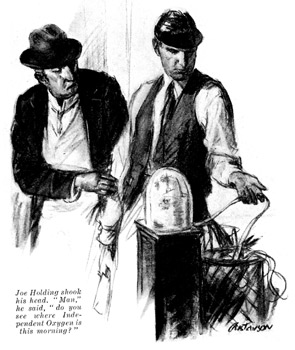
"I how it is," said Horace. "It will be very nice to have a great deal of money, Emmy. Yes, you are quite right. Where -- ah -- do I buy this -- ah -- Independent Oxygen?"
"I have written that on the envelope, too," said Miss Emmy. "The brokers Mrs. Trent uses are Holding and Keeps on Main Street. It is all written there on the envelope, Horace. Just do what I have written on the envelope. And, Horace, dear --"
"Yes, Emmy?"
"Please do it before you go to your class, brother. There is a very lively market, Professor Trent says, and Independent Oxygen may advance in price any moment. You will attend to it right away, won't you?"
"Yes, yes; of course, Emmy!" the professor said. "Large affairs I never forget -- never! Little ones I may sometimes --"
"Don't put that in your pocket, Horace -- that's the corner of the tablecloth, not your handkerchief," Emmy said, and she made sure that Horace had the envelope in his pocket, and she kissed him with unusual affection as she parted from him at the front door.
Professor Willicks turned toward Main Street and walked at a brisk pace, thinking of the answer he had prepared for the annoying question the red-headed youth had asked him in class three days before. He hoped he had prepared an answer that met any trick the boy had hidden in his question. The fellow was bright, but he was impudent, and the last time Professor Willicks had prepared an answer it had been met with howls of joy by the class.
Now, in this question the red-headed boy had asked there was, firstly --
Professor Willicks, finding himself on Main Street, stopped short and stroked his upper lip with the side of his left forefinger. There was something rather insistent Emmy had asked him to attend to, if he could just remember what it was. He went to the edge of the sidewalk and looked up and down the street, questioning the storefronts. It was not food; it was not a book -- His eye alighted on a narrow shop on the window of which was the sign "Z. Marx, The Colwin Valet, Pants Pressed While You Wait," and he remembered that Emmy had been urging him -- for how long? a month? a year? -- to have his trousers creased. He entered the shop and entered a high-boxed and curtained inclosure, and tossed his trousers out.
"And please make haste, Mr. Marx," he said. "I am due at the college in a very few minutes."
At noon Professor Willicks went home with Professor Sharp for luncheon and the afternoon passed very pleasantly over Professor Sharp's manuscripts and cigars, and it was late in the afternoon when the telephone bell rang and Professor Sharp handed
Horace the receiver. Emmy was speaking.
"Horace?" she said. "Professor Bliss said he thought you were there. I just wanted to ask you, Horace -- you didn't forget my errand?"
"No, no, Emmy! " said the professor. "I remembered perfectly this time. All attended to, sister."
"I'm glad," said Miss Willicks. "It means so much to me."
"Something she thought you might have forgotten to do?" asked Professor Sharp.
"My trousers," explained Horace contentedly. "Emmy has been wanting me to have them pressed this long time."
"I thought you looked peculiar some way," said Professor Sharp. "Now, this Shelley letter..."
About six Professor Sharp telephoned Miss Emmy that Horace was going to remain for dinner, and the evening was spent with the manuscripts, and it was midnight when Professor Willicks started for home. Miss Emmy was long since in bed and asleep, and Horace was soon sleeping the sleep of the innocent.
The next morning at breakfast Miss Emmy referred to the purchase of the Independent Oxygen shares, but she did it merely in thanks.
"I am so glad you did not forget, yesterday," she said.
"I do not always forget, Emmy," Professor Willicks said with a gentle smile.
Late that afternoon, in the room he called his study, Professor Willicks put his hand in his pocket to find his handkerchief -- which he had left in his hat -- and he found Emmy's envelope. He looked at it curiously, wondering why Emmy had given him a letter to mail with no stamp on it, and he put on his spectacles and turned the envelope over to read the address, and suddenly he remembered that he had been told to buy 400 shares of Independent Oxygen at 20.
"Dear, dear!" he exclaimed. "Emmy will be distressed. I must attend to this at once."
He went down and put on his hat and went out. Fortunately, Emmy had run over to the Trents. Unfortunately, the day before had been the day -- which some of you will remember -- when President Glower of Independent Oxygen gave out the annual statement of the company and issued his Address to the Stockholders. Those who owned Independent Oxygen at that time will remember the phenomenal jump Independent Oxygen made that day on the Exchange, beginning its remarkable upward soaring. Opening at 20, it jumped to 28 on the first trade, to 36 on the next, and then glided pleasantly upward, to close at 43 1/2 The next day it opened down, at 40 3/4, and climbed steadily on every bid, to 54 1/4, at which figure it closed, just as Professor Willicks put on his hat to go down to Holding & Keeps to buy 400 shares at 20.
"My dear man!" Joe Holding exclaimed, laughing in Horace's face as he held him by the lapels of his coat. "You're too late. You want to get up earlier in the morning to get Independent Oxygen at twenty in a market like this; you want to get up about forty-eight hours earlier. Independent Oxygen is up to fifty-four and a quarter."
"Dear me!" said Professor Willicks unhappily. "I'm too late, I fear. It's most unfortunate -- most!"
"And I wouldn't touch it at fifty-four and a quarter, if I were you," said Joe Holding. "Too high, that's my opinion, unasked and freely given. I look for a recession."
"You mean it will go down again?" asked Horace hopefully.
"If I know anything about it -- yes!" said Joe Holding.
"Thank you. You are -- ah -- most kind," said Professor Willicks. "You don't know how you relieve me, sir. I thank you most kindly. Ah -- may I leave my name and address, and will you let me know when Independent Oxygen is -- ah -- again at twenty?"
"That's what I'm here for," said Joe Holding. "That's your bid price, is it?"
"Yes. Quite so!" said Horace. "And thank you again." After this interview, which had at first made Horace feel most miserable, he felt better again. Independent Oxygen would recess, or whatever it was Mr. Holding had said.
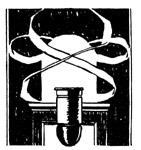
On the whole, Horace thought, it would be better not to annoy Emmy by saying anything at all; she would be delighted because Independent Oxygen was so much higher than 20, but she did not know it was going to take a recess. When it recessed back to 20, Horace told himself, he would quickly buy 400 shares at that price, on the 25 per cent margin Emmy had mentioned, and all would be well.
Emmy did come home from Eliza Trent's in quite a flutter. She actually threw her arms around Horace's neck, kissing him twice and putting his distance glasses quite askew on his nose.
"Now, now!" exclaimed Professor Willicks as playfully as he could. "What's all this?"
"Horace, I just can't help it! I could sing and shout! I've just been over to Eliza's, and do you know what Independent Oxygen has done? It has gone up to fifty-four and a quarter! Horace -- think of it! Eliza figured it out for me -- our two thousand dollars is almost twenty-two thousand now!"
"Dear me!" said Horace, turning a sort of apple green.
"And Eliza's husband says that's only the beginning, Horace! That's only the result of President Glower's revelation of the actual condition of the company. It is merely putting Independent Oxygen in its proper place in the list. The real upward movement hasn't taken place yet, Horace. Just wait until the whole list begins to move upward! Horace, we're going to be rich! Rich, Horace!"
"Dear me!" said Horace again, his color shading off from apple green to bister, which is a sickish yellow. "I'm -- you overwhelm me, Emmy. I feel somewhat ill. I think I will lie down awhile."
"I shouldn't have told you so suddenly, poor dear," said Emmy contritely.
For five days Professor Willicks remained in bed with something like jaundice, and during that time he was even more interested in the stock-market reports than Emmy herself. He slept with a copy of the Wall Street final closing edition of the newspaper in his hand.
Joe Holding had been right. Independent Oxygen did recede -- it receded to 39 3/4 like a man dropping back for a run before making a high jump, and then it really did begin to soar. The whole list, as you know, soared. With it Independent Oxygen went upward. It passed its previous highest mark of 54 1/2 and went to 60.
When Independent Oxygen reached 62 1/4 Professor Willicks took pencil and paper and did some figuring. He could no longer hope to buy Emmy 400 shares, but he decided that he had better buy what he could. It was now the middle of summer and Emmy had gone to the Dannerts in the Berkshires to stay until the opening of college in the fall, and Professor Willicks was, at least, not confronted by Emmy's happy eyes. She wrote: "I am so happy, Horace dear! Each day when I look at the Ind. Oxy. quotation I utter a blessing on dear Professor Trent and Eliza for showing me the way to this new great happiness. I am learning to drive a car, Horace; we must have a car -- a good one -- when we go to Concord; it will put Boston at our door. Jane says she knows of a very fair house at Concord we can get for thirty thousand dollars. It will need some repairs -- not over five thousand."
With Independent Oxygen at 62 1/4 and $2,000 to invest on a 25 per cent margin, Professor Willicks figured that he could buy for Emmy 128 shares. This was not 400, but it would be something, and he went down to Holding & Keeps' office and handed Mr. Holding the slip of paper on which he had jotted down his figures. Joe Holding shook his head.
"Man," he said, " you must have been asleep since I don't know when. Look at that board -- do you see where Independent Oxygen is this morning? Sixty-eight."
He drew a line through Professor Willicks' 62 1/4.
"And this twenty-five per cent margin notion," he continued, drawing a line through that figure, "has been dead just about since Noah quit the ark. Fifty per cent is what has to be put up on the blue-chip stocks, and I haven't heard anybody yet call Independent Oxygen a blue chip. I might take a small buy at sixty per cent, but I'm not keen for it."
"How many shares could I buy on a sixty per cent margin for two thousand dollars?" asked Horace. Joe Holding looked at the quotation board on which the boy had just changed Ind. Oxy. from 62 1/2 to 68.
"Forty-five, anyway," said Joe Holding.
"I'll -- I'll consider it," said Professor Willicks. "There will -- do you think there will be any recessions? In the price? In the -- ah -- amount of margin required?"
"This last statement of brokers' loans ought to slide some of the list down some," Joe Holding said. "I don't know what the Federal Reserve is liable to do. No chance of smaller margins, professor."
The rest of the summer was a period of misery for Professor Willicks. Every letter from Emmy was a knife in his heart. Each week, as Independent Oxygen continued to rise, she wrote more joyously. She was planning a world tour. They would spend a year at Oxford. She had seen just the car she would buy, and only six thousand dollars. Wouldn't it be better to buy a house in Boston -- the library was there; Concord only a few minutes away. Jane knew of a very fair house in Wellesley Hills for thirty-eight thousand dollars.
When Emmy returned to Colwin she was radiant. She seemed twenty years younger, but she cried out when she saw Horace -- he seemed twenty years older. Independent Oxygen was hovering around 112 after the late August jump, and Emmy counted her wealth at about $45,000. Professor Trent and Eliza said Independent and Universal Oxygen were to merge, and that Independent would touch 200 certainly.
"I'm going to hold for two hundred, Horace," Emmy said. "Eliza thinks Independent Oxygen will go beyond that, but I won't be greedy. I'm going to sell at two hundred. I'll have eighty thousand dollars then, and that will satisfy me."
Horace groaned.
"You poor dear!" cried Emmy. "You're not well."
"I'm mighty far from it, Emmy," Horace said.
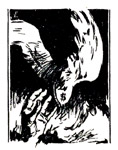
That fall Independent Oxygen continued to climb, as we all know, with the rest of the list, but Professor Willicks was given a leave of absence on account of ill health. He spent the beautiful fall days in a chair in his side yard, a book open on his knee, but his forehead creased with ineffectual thought. His physician could discover nothing seriously wrong -- a slight liver derangement perhaps, but nothing else -- and could advise nothing. Each upward step of Independent Oxygen turned Professor Willick's face a tinge yellower and gave his eyes a more hopeless look.
"You've got to exercise more, Horace," the doctor told him. "You'll do no good sitting here. Walk, man!"
So, as November neared, Professor Willicks began to walk. He also began to talk to himself -- and you know what a bad sign that is. Yet, in spite of her concern regarding Horace, Emmy could not avoid being radiantly happy. Independent Oxygen crept upward and upward. It reached 150. It reached 175. Late in October it crept to 189, to 192, to 198, to 198 1/2.
"Horace," cried Emmy ecstatically, "tomorrow -- or next day at the latest -- Indox will touch two hundred!"
She had begun to use the Street term for Independent Oxygen, so constantly did she and Eliza Trent talk of it.
"Yes, two hundred," said Horace miserably. "Yes, Emmy."
"And I am not going to break my word, Horace. At two hundred we will sell. I think, Horace, if you feel able, you had better be at Holding and Keeps' tomorrow. You can sit there, and when Indox touches two hundred -- sell, Horace. Sell, you understand. Eighty thousand dollars is enough for us."
"Yes, Emmy," Horace said meekly.
That night he hunted up an old revolver he had had when a boy. It was a ridiculous affair with a revolving chamber for six cartridges and a pearl handle. With his door locked he cleaned it and oiled it. He felt old and ill and worthless.
The next morning, before the hour for the opening of the stock market, Horace went out of the house. He walked toward the center of town and turned west on the main street until he reached Toomey & Grane's hardware store. He stood a moment or two, looking in the window and getting his courage together, and then entered.
"Yes, sir? What's yours today?" asked a clerk briskly.
"I want to shoot a dog," said Professor Willicks, fingering his coat lapel. "You sell cartridges here? Cartridges for pistols?"
"We certainly do!"
"I'd like to buy one."
"One? Only one?"
"One will be enough -- if you sell one only. I don't want any more -- just one. How much will one be?"
"One? What caliber, for instance?"
"It's about so long," said Professor Willicks. "The pistol is that long, about. How much will a cartridge for such a pistol be?"
"Well, I'll tell you, sir," said the clerk. "We'll say a nickel -- five cents -- one-half dime -- so there'll be no hard feelings. But you've got to know what caliber you want. Is it a twenty-two? Or a forty-five? Or a thirty-eight?"
"I'm sure I don't know," said Professor Willicks.
"I'll tell you what you do," said the clerk. "You go home and get the pistol and bring it down here, and I'll fit a cartridge in it. That's the way to do it."
Professor Willicks went out of the store. Fortunately, when he reached home, Emmy was over at Eliza's -- he could not have stood saying anything to her or hearing her speak to him. He took his revolver from his bureau drawer and dropped it into his coat pocket. He walked downtown again and as he neared the hardware store heard a newsboy crying, "Great crash in stocks! Whole list goes down!" or words to that effect, and he wedged his way into Holding & Keeps', where half the town seemed crowded. He glanced at the board. Independent Oxygen stood at 163, and even as Horace looked the boy changed the quotation to 151 1/4. A strip of paper tacked above the board announced, "Ticker one hour behind market."
"It's a crash," someone beside him said to Horace. "The bottom is dropping out. I'm cleaned. How about you?"
For the first time in weeks Professor Willicks smiled.
"Do you think it is going lower?" he asked.
"Look at that board! It's slumping while we're looking at it. Nobody knows where it is. See that?"
The boy was changing the strip of paper; the new one said, "Ticker 1 hr. 30 minutes behind market."
When Horace went home the last ticker figures had been dotted onto the tape and the final sale of Independent Oxygen had been recorded at 143 3/4. As he opened the front gate his hand touched something heavy in his pocket. He was surprised to find it was a revolver; the morning seemed ages ago. He felt ten years younger.
Emmy, when he went inside, was at the telephone.
"Well, that's what I think, 'Liza," she was saying, in the same chipper tone that had come to her with her dabbling in stock. "It's a flurry; the market is basically sound. Yes, indeed; I'm going to hold on. I'd not be so silly as to sell on a temporary dip. Yes; thank the professor for me. Closed at one four three and three-quarters."
Each day after that Independent Oxygen led the way downward. If some ambitious diver of a stock fell 10, Indox jumped down 25. The middle of November found it at 28; that day it dropped by eighths to 22 1/2 Emmy Willicks made a wry smile.
"Isn't it what Eliza says?" she asked Horace. "'Easy come, easy go.' What goes up must come down! Such is life! No new clothes for me this winter, Horace, darling. But there'll be many more keeping me company."
She did not, to Horace's surprise, take the matter to heart at all.
"Oh, I just hoped all those things!" she said. "You never can tell about the market, Eliza says. But I'm through, Horace. It's too exciting for elderly dames. Are you going down tomorrow?"
Horace said he was. It was not necessary to say where "down" was -- it was Holding & Keeps. "If Independent Oxygen goes down to twenty, Horace, sell out," Emmy said.
That night Horace brought home to Emmy what was practically the $2,000 she had given him in the beginning. Like Emmy, he had learned a few things about playing with stocks and he deducted what he thought would be the commission of a broker. He handed the money to Emmy and she folded it carefully and put it in her purse.
When Professor Horace Willicks went up to his room he put the pearl-handled revolver far back in the lowest drawer of his bureau. He closed the drawer and straightened up and took a long deep breath.
"Ah!" he said cheerfully. "Yes, indeed!"
He felt happy. And why not? He was one of the few to whom the Big Drop had brought relief and an actual money betterment. He had saved the five cents he would otherwise have spent for a cartridge.